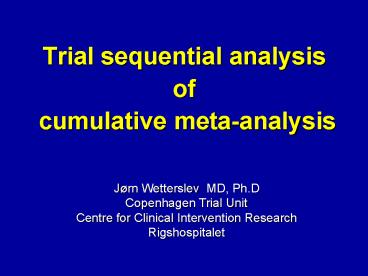Trial sequential analysis of cumulative metaanalysis
1 / 35
Title: Trial sequential analysis of cumulative metaanalysis
1
Trial sequential analysis of cumulative
meta-analysis
Jørn Wetterslev MD, Ph.D Copenhagen Trial
Unit Centre for Clinical Intervention
Research Rigshospitalet
2
Group sequential boundaries in a single trial
Zk
Reject H0
Z2
Z?
-1.96 (plt0.025)
Accept H0
IF2
IF1
IF3
IF4
100
(Number of patients randomised)
IFk Ik / IMax
3
Group sequential boundaries same group size
Z 1.96
Z - 1.96
4
Lan-DeMets discrete sequential boundaries
- Offers an opportunity for analysis
- at any time during a randomised trial without an
increase in the final risk of a type 1 error - Offers an opportunity to avoid unnecessary
inclusion of participants in a trial when
sufficient evidence has been reached before the
calculated fixed sample size
5
Discrete sequential boundaryin a randomised
clinical trial
Z-value
Discrete sequential boundary
Z-curve
Z 1.96
P 0.05
ni / N
N/N1.0
Information fraction
6
Test when you want!
- Offers an opportunity to transfer group
sequential boundaries from a single randomised
trial to - trial squential monitoring boundaries in
cumulative meta-analyses as trials size vary a
lot and cannot be changed retrospectively
7
Meta-analysis
- Advantages
- Increase strenght and precision
- Makes it possible to analyse for bias
- Cautiousness
- Repetitive updating increase risk of type I
error - When is the information size sufficiently large
? - Avoid Garbage in - garbage out
8
- But what about
- cumulative meta-analysis ?
- There seems to be a substantial risk of increased
random error in cumulative meta-analysis - They are also undergoing repetitive testing on
accumulating data !
9
Trial sequential analysis
- Estimate required information size
- Trial sequential monitoring boundaries
- Adjust for repetitive testing
- Re-evaluate the evidence in a cumulative
meta-analysis
10
How much information do we need to make a
decision?
- How do we protect the error risk levels when
cumulative meta-analysis are - updated repeatedly with new trials and analysed
multiple times ?
11
The required information size in meta-analysis
- should be at least as large as the sample size
in a single well-powered randomised trial
12
Sample size in a randomised clinical trials
- The number of participants to be included in
the trial to detect or reject an anticipated
intervention effect µ with the chosen error risks - Type 1 error ?
- Type 2 error ? (power 1- ?)
13
The sample size in a randomized clinical trial
with equal group sizes
- SS 4 (Z?/2 Z?)2 ? / ?2
- ? PC - PE intervention effect
- ? P (1- P) the variance P (PCPE) / 2
- PC and PE
- event rates in control and intervention group
14
Information size in meta-analysis
- Also the information size in a cumulative
meta-analysis should be increased with multiple
up-dating when testing are repeated adding
information from new trials
15
The information size in a meta-analysis with
equal group sizes and a binary outcome
- IS ? SS 4 (Z?/2 Z?)2 ? / ?2
- ? PC - PE intervention effect
- ? P (1- P) the variance
- P (PCPE) / 2
- PC and PE
- event proportions in control and intervention
group
16
Information size in acumulative meta-analysis of
randomised trials
- Should account
- For heterogeneity between trials
- Repetitive testing on accumulating data when the
meta-analysis is up-dated
17
An a priori heterogeneity- adjusted information
size (APHIS)
- Calculated setting µ and ? to a clinically
relevant value possibly found in evidence based
on other interventions in that area
18
Low-bias heterogeneity-adjusted information size
(LBHIS)
- Calculated based on the meta-analytic estimate
of µ and ? for k trials with low risk of bias in
the meta-analysis
19
Sum upinformation size in a cumulative
meta-analysis
- Should be increased with the heterogeneity
between the trials estimates of the
intervention-effects - Should be increased in multiple up-dating adding
new information from new trials
20
Trial sequential monitoring boundary
Zk
Reject H0
C1
C2
C3
Z?
1.96 (plt0.025)
IF2
IF1
IF3
IF4
100
(N IS)
(Number of randomised patients)
IFk Ik / IMax
21
Trial sequential monitoring boundary
Zk
Reject H0
Z2
Z?
1.96 (plt0.025)
IF2
IF1
IF3
IF4
100
(Number of randomised patients)
IFk Ik / IMax
22
Trial sequential monitoring boundary
Zk
Reject H0
Z2
Z?
1.96 (plt0.025)
Accept H0
IF2
IF1
IF3
IF4
100
(Number of randomised patients)
IFk Ik / IMax
23
Trial sequential analysis (TSA)
Zk
3.71 (P 0.0001)
Z 1.96
P 0.05
Number of randomised patients
N IS
Discrete sequential boundary
Cumulative Z-score
Nominal P-value
24
- An example from perioperative medicine
- Perioperative beta-blockade
- in
- non-cardiac surgery
- Bangalore S et al
- Lancet 2008
25
Non-fatal myocardial infarction perioperative
ß-blockade
26
Non-fatal myocardial infarction perioperative
ß-blockade
27
Non-fatal stroke perioperative ß-blockade
28
All-cause mortality with perioperative ß-blockade
29
All-cause mortality with perioperative ß-blockade
30
Atrial fibrillation off vs. on pump CABG
31
Atrial fibrillation off vs. on pump CABG
APHIS 5,021
30
72
I2 47.3
Interventionseffekt RRR 20
32
AT III for critically ill patients No
significant interaction between risk of bias and
intervention effect I2 0 probably due to
lack of effect of AT III on mortality
33
Trial sequential analysis of AT III effect on
mortality in 3,458 patients
APHIS 3,263 RRR 10 (49 to 44)
34
Trial sequential analysis of AT III effect on
mortality in 3,458 patients
LBHIS 25,303 RRR 5
35
Thank you !































